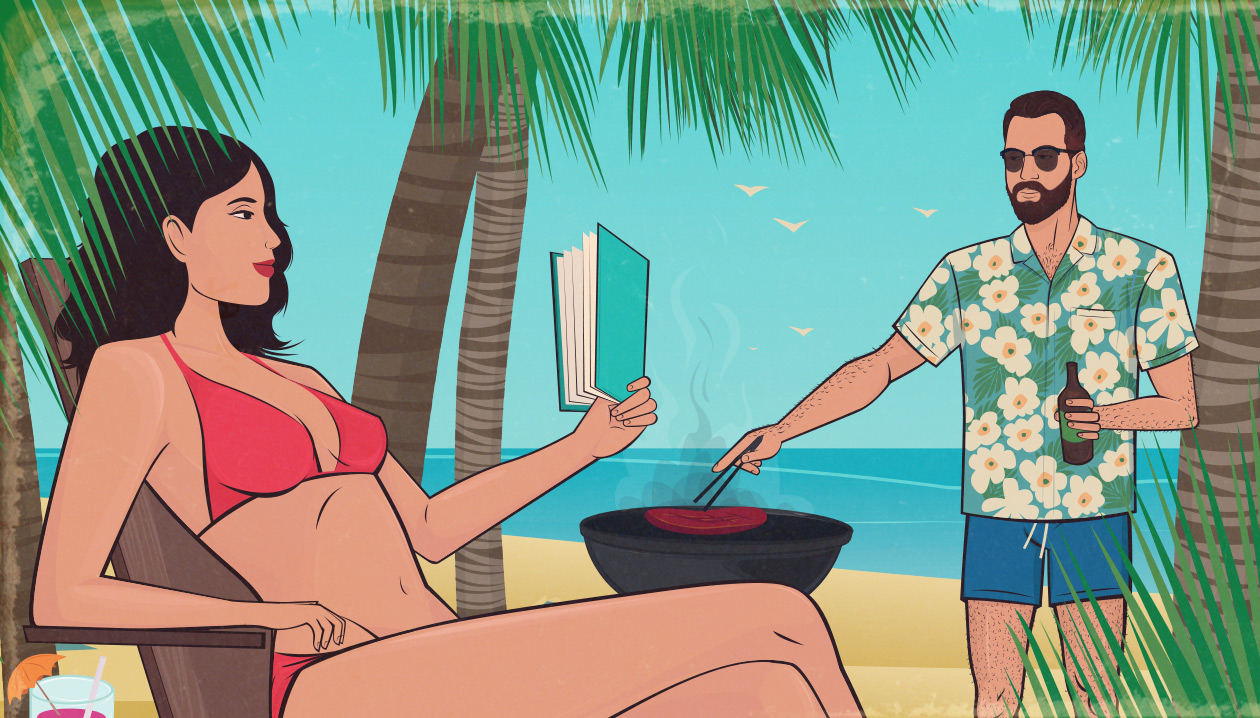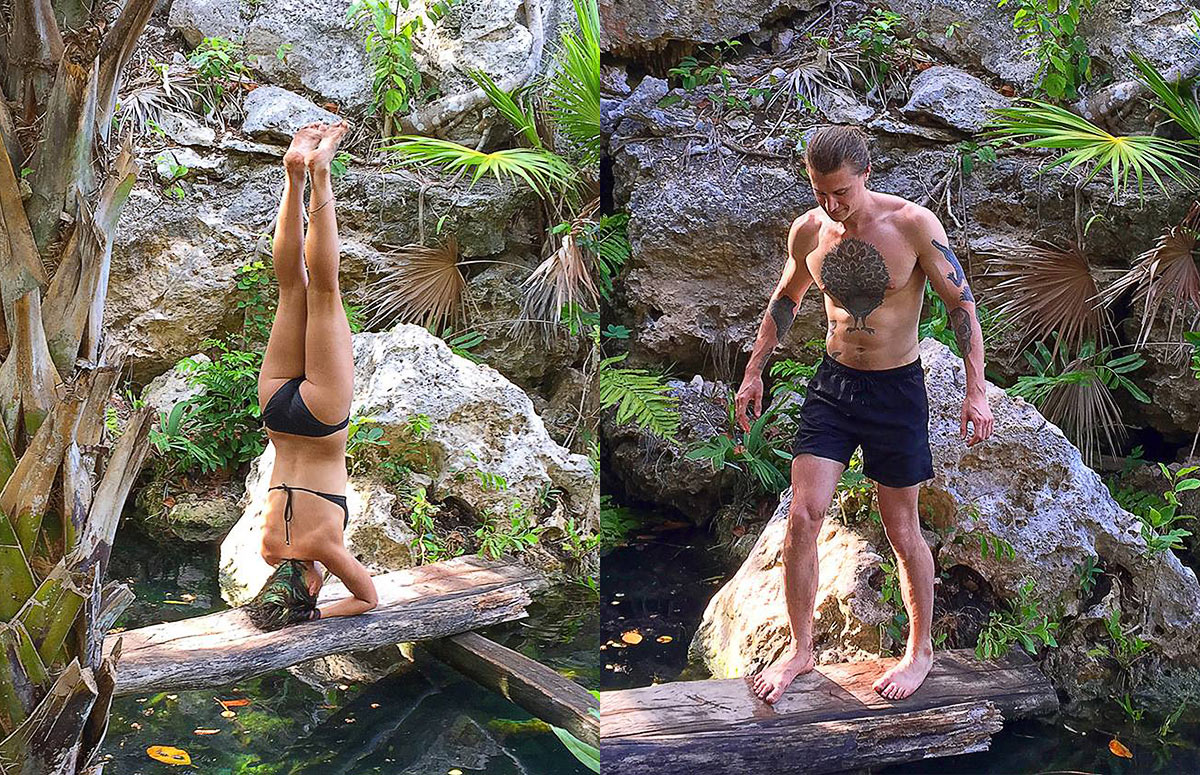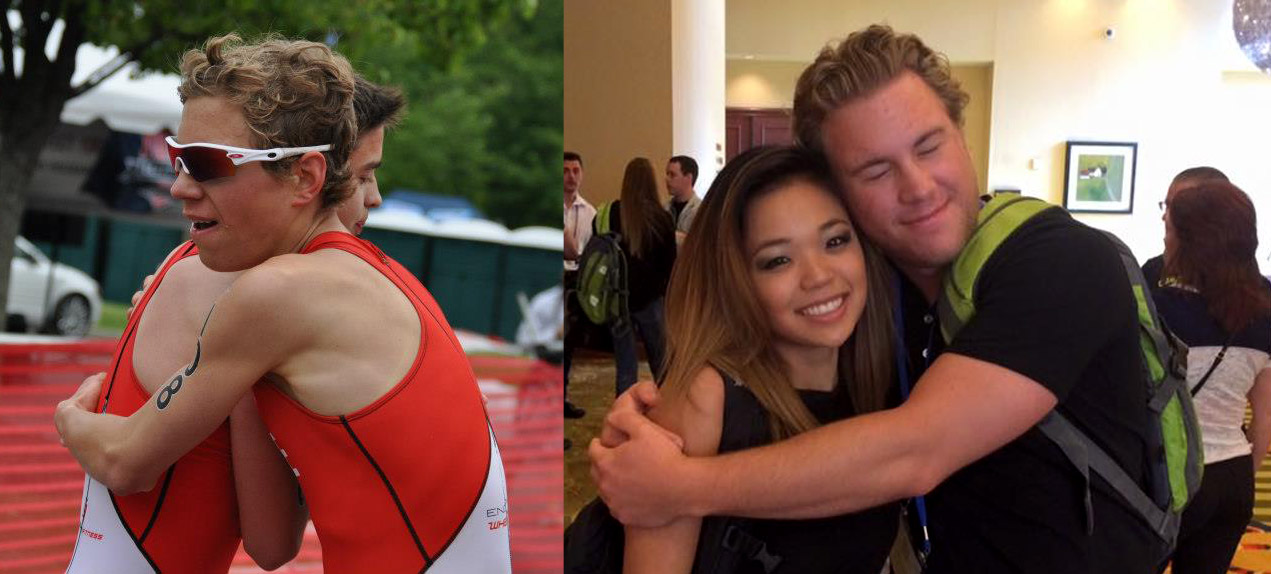
You’re eager to build up a more muscular physique, and things are going super well. But lo and behold, disaster strikes—and not just a run of the mill muscle disaster, like running out of milk, but the worst kind of disaster imaginable: a vacation.
I bet just the mention of a vacation has your heart racing and your mind spiralling down into panic mode. Unfortunately, I’ve been there. I know what you’re thinking. Will all of your hard-earned muscle wither away if you don’t go to the gym for a week or two? Can you build muscle with bodyweight workouts? How many mojitos does it take to spike muscle protein synthesis? Why don’t they make luggage big enough to fit a barbell? Is there real coconut in a piña colada, or does it count as junk food? Will the customs agent mistake your whey protein for cocaine? (Can you really get jacked in prison?) How much of a tan will be enough to disguise your now skinny-fat physique?
In desperation, you might start googling around to learn more, but since only 3% of the population is trying to gain weight, good luck trying to find an article about how to maintain/gain muscle while travelling.
So what do you do?

I got back from Mexico a few weeks ago. Above you can see my girlfriend and me in a cenote having a balancing competition. (It was a tie.) After a couple weeks of eating tons of delicious seafood and tacos, walking 5-6 hours most days, and having at least a couple drinks most nights, I came back just as muscular and finally looking like the 1/4 Cuban that I am (aka still 3/4 pale).
Even though we base our articles on research rather than anecdotes, we still like to walk the walk before writing about something. Luckily, the three of us get the opportunity to travel fairly often. Jared just got back from a small little island in Northern Canada, and Marco recently went hiking through Peru.
It’s about time we write about one of the most commonly asked question we get: “How do I keep up with this muscle-building stuff while I’m on vacation? Am I totally screwed?”
First of all, there’s this misconception that being a strong healthy dude makes it harder to travel. That couldn’t be more wrong. Being a strong healthy dude makes travelling so much better. You’ve got muscles that can carry around a whole family’s worth of luggage without breaking a sweat, you have the cardiovascular fitness to race your girlfriend up pyramids (and win), you have the rugged immune system that resists catching a cold on the airplane, the energy levels for every adventure, and the brainpower to think clearly even when jet-lagged.
Lifting and eating well in your day-to-day life makes travelling radder. So if you’re at a point where you’re healthy and happy with your body, great—you don’t really need to worry about much while on vacation. Just have fun, be active, eat delicious food, go back to your healthy strongman routine when you get back.
This article isn’t about that though. You’re probably a guy who’s still trying to get bigger and stronger. This article is about building muscle while you’re travelling, not just being a strong and fit dude while travelling.
First, let’s get the bare basics out of the way:
- Your customs agent probably won’t mistake your whey for cocaine. I got pulled aside for further questioning the (one and only) time I tried to travel with individual serving size ziplock bags of whey. But the guy interrogating me in the scary little room was pretty buff, and after one little whiff of my little baggies he was giving me lifting advice, not handcuffs. Nowadays I bring a few prepackaged chocolate chip cookie dough Quest Bars instead. Less drama, far easier to eat on the go, more calories, more fibre, and more delicious. (And we aren’t even being paid to say that!)
- A mojito or three will neither create nor prevent muscle protein synthesis, but it will temporarily increase your testosterone levels by about 17% if you’re a young guy (study). Seven mojitos, on the other hand, will reduce muscle protein synthesis and suppress testosterone production (study, study). That doesn’t matter if it’s fairly irregular, but an alcoholic will really struggle to maintain a muscular physique, let alone build one. Anyway, so as long as you aren’t a frequent binge drinker, there’s no reason to stress about drinking.
- Moctezuma’s revenge is definitely the ultimate weight loss cleanse, and you definitely don’t need a weight loss cleanse. Beware the street vendor with the reckless look in his eyes.
With that covered, we can get to the interesting stuff. To cover the elusive science of what happens to muscle when travelling, we brought in the big guns—Armi Legge.
Armi has long been known in the fitness industry for being one of the best researchers out there. He’s a bit of a controversial figure in the best way, because he’s a young guy who’s not afraid to stand up to some of the most influential guys in the industry when they get their facts wrong.
Recently, he wrote up a piece in Alan Aragon’s research review (which is perhaps the most respected research review in the fitness industry). As luck would have it, that piece was on building muscle on the road. Armi’s latest area of research has been everything related to muscle, fitness and travel.
Armi Legge’s Tips for the Skinny Traveller

Armi’s a naturally skinny guy himself, he’s recently built a ton of muscle, and he travels pretty much constantly for business and adventure. Not only does he maintain his muscle while travelling, he’s building tons of muscle while travelling (as you can see above).
We used this as an opportunity to help you out (since he’s done a ton of research into this), and it’s also a chance for him to talk about his rad new eBook about staying fit, strong and lean while travelling.
Without further ado, here are my questions, with his answers in blue.

What will happen if we lose weight while not lifting? We’re naturally skinny guys. Airports, carrying luggage around, strolling around exciting new cities, being way too far away from a refrigerator, needing to get most of your meals from restaurants, etc. This all means calories burned + fewer calories eaten. The perfect storm for tons of weight loss.
Armi: If you lose weight without lifting, then you’ll mostly lose fat, along with some muscle. The larger your calorie deficit, generally the greater your risk of muscle loss. The amount of muscle you lose is largely dependent on your genetics, although the absolute differences between people tend to be pretty small.
Most research also shows that eating a higher percentage of your diet from protein can generally help you retain more muscle while under-eating. So if you don’t lift weights and you under-eat, make an effort to get in slightly more protein.
If you gain weight, you’ll gain some muscle and fat. That’s something most people don’t realize—any calorie surplus, even if you aren’t lifting weights, generally causes some muscle growth. The problem is that a lot more of the weight tends to come from fat. But since you’re reading this, under-eating is probably more of an issue for you than over-eating.

Okay, so let’s say I decide to go traveling and don’t plan on lifting at all. I do a pretty hearty full body workout the day before leaving. How long before my muscles begin to atrophy if I were to eat enough to maintain my bodyweight? And does it matter? I mean, how much muscle loss are we talking about, and how hard will it be to regain?
Armi: I’d say you’d have at least two weeks or so before you started to lose muscle, assuming you were eating enough to maintain your weight. You’d probably lose a little strength after a week, but that would mostly be neurological—feeling rusty. After a few workouts you’d be back to your normal self.
The second part of your question is really interesting. I’d say that a week or two without training isn’t that big of a deal, assuming you don’t do that every month. You might lose some muscle and strength, but you’ll gain it back much faster. It’s easier to regain or maintain muscle mass than it is to build it in the first place. This is partly due to satellite cell activation.
In a nutshell, when you lift weights, special stem cells called “satellite cells” donate their myonuclei to your muscle cells. That extra nucleus helps the muscle support a slightly larger area, and your muscles get bigger. The interesting thing is that those myonuclei stick around even if your overall muscle size shrinks. When you start lifting again, it’s generally easier to shoot back up to your previous size, partly thanks to those new myconuclei.
There have been a few studies on this, too. In general, 3-6 weeks off from training will cause around a 6-12 percent drop in strength. That’s really not much when you consider how long these people weren’t training. In these studies, muscle mass didn’t change much after 4 weeks. There probably was a drop in muscle mass, but it was small enough that it wasn’t measurable.
I’d say that if you’re traveling for two weeks or less, it’s okay to stop training completely. If you’re traveling for more than two to four weeks, you can probably expect to lose a moderate amount of muscle mass and strength. It’s hard to say exactly how much, but probably not enough to have a significant impact on your appearance.
When you get back into training, you’ll regain your lost strength and size much faster than when you had to build it in the first place.
But, I think it’s still a good idea to do at least a little strength training while traveling for another reason—habit formation. Even if you just do a 10-minute bodyweight workout twice a week, that helps you maintain the habit of working out. When you come home, it will be much easier to get back into your normal training schedule.
In short, you can maintain your muscle mass and strength without training for longer than most people think.

What’s the bare minimum amount of lifting needed to maintain muscle?
Armi: I’d say once per week of heavy, full-body strength training would help you maintain most of your muscle mass for one to two months. That’s assuming you’re eating enough to maintain your weight. (You’d probably lose some muscle if you were in a deficit.) You’d lose muscle mass eventually on this routine, but one full-body session per week is probably enough to maintain your muscle mass for several months.

Is there anything in particular you’d recommend for a naturally skinny guy who wants to not just maintain, but build muscle while travelling? (Keeping in mind that our tendency is to accidentally lose weight while travelling.)
Armi: Great question. I tend to default toward under-eating too, so this is something I’ve thought about. Here are a few strategies that work well for me:
- Pick more calorie-dense foods. Nuts, protein bars, whey protein, chocolate and dried fruit are all good choices. If you can’t get a large meal at a restaurant, you can supplement your calorie intake with one of those options or something else. When I was traveling in England, the portion sizes were much smaller than normal, so I’d often have a protein bar or something else to supplement my calorie intake.
- Pack some snacks. Beef jerky, whey protein, apples, bananas, yogurt, or anything else that has some protein and fiber can work well. If I don’t bring something, I’ll just forget to eat.
- Eat more often. I get full easily, so spreading my calories throughout the day makes it easier to eat enough.
- Make time to eat. When you’re traveling, it’s easy to get distracted by exploring a new places and meeting new people. In the end, it really just comes down to reminding yourself to get in a meal.

Bonus Tips From the Beastly Team
Jared’s travelling tips:
- It’s normal to feel a little worn down when travelling. Everything is a new experience, meaning there’s no chance to fall into your energy saving auto-pilot routine. Making decisions all day long, however small, is tiring. Bringing some super easy snacks along, like a Quest bar and some water, will remove the stress of figuring out where your next meal will come from. This will help keep your willpower, mood and energy high while sneaking in calories/protein throughout the day. (Sharing your snacks will also keep your travelling mates from getting hangry on you.)
- A light bodyweight exercise circuit in the morning, while your willpower is still high, will improve your energy levels throughout the day, and also give your muscles a reminder that they’re still needed.
Shane’s travelling tips:
- Armi’s travelling guide has some really great recipes that are really easy to make, even when travelling. But let’s be real here—when you’re travelling you’ll probably be getting a lot of your calories from restaurants and corner stores. Corner stores tend to sell milk, fruit and nuts, which are perfect muscle-building foods. At restaurants you can order a meal that centres around a protein (rather than a vegetarian style dish). Chefs often cook with a lot of fat and salt, so the main problem with eating out all the time is that the food is high in calories. That’s not much of a problem for us, so don’t worry about it.
Marco’s Travelling tips:
-
Oh man the Moctezuma thing. I had some real bad street meat in Peru…
-
I do makeshift workouts, often just for fun. Squats with my brothers on my shoulders, workouts in the park—that kind of thing. In Peru it was a run through Cuzco culminating hill sprints (although I forgot to consider the low oxygen levels at such a high altitude and passed out afterwards), in Hong Kong they had a bunch of bars to play on, and in Japan they had a really cool park to run through.
-
I guess if you put a tip from me, it would be to explore and enjoy your surroundings. There’s exercise related stuff everywhere if you open your mind to it. However, this would only take up a short portion of the day. Just 15-30 min in the morning before setting out for more adventures.
Conclusion
I hope these tips not only help, but also make you a little bit less stressed about venturing outside of your regular routine. The worst thing is getting into a good healthy lifestyle and then thinking that you can’t take your body anywhere anymore. You can. A strong healthy body is less fragile and more versatile than a weak one.
If you have any questions, tips, success stories, horror stories—who doesn’t love travelling horror stories?—just drop them bellow.
And if you found any of Armi’s advice interesting or helpful, I think you’d really love his program. It works perfectly in conjunction with a good lifting and nutrition plan, since it covers absolutely everything you need to keep in mind while travelling, and I wouldn’t be surprised if it made your trip way cheaper too—more than paying for itself with just one trip. You can find his program here: The Fit Traveller. (That’s an affiliate link.) If you’re not interested in the program, clicking on the back arrow at the top of his page will take you to all of his free articles, which are pretty sweet. He writes about his research into performance, building muscle, losing fat, and flexible dieting.
Happy travelling, and don’t forget your muscle in Mexico!